Home run
Claas Thüringen GmbH (DE)
The HORSCH site in Ronneburg is not only a large production site – it also represents the company in the Thuringian area. The HORSCH sales partner on site is Claas Thüringen. We talked to manager Jonathan Köber.
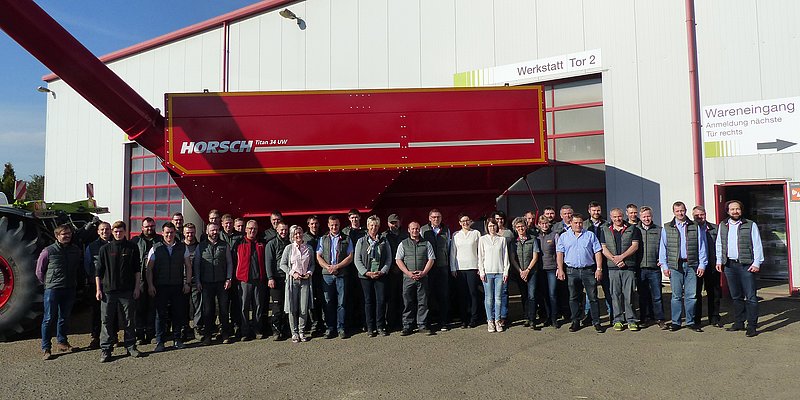
An industrial area in Schwabhausen, near the A4 motorway. This is where the headquarters of Claas Thüringen is situated – with an easy access to the main routes and right in the centre of the sales area. There are further branches in Barchfeld, Buttelstedt, Ebeleben and Vachdorf. We met manager Jonathan Köber in Schwabhausen.
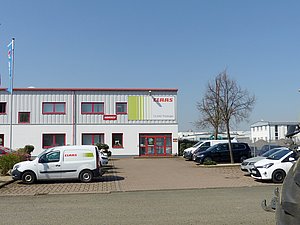
Mister Köber, according to the competitors, the Claas-owned agricultural engineering specialist companies are said to mainly concentrate on the tractor, combine and chopper business. Is this true?
Jonathan Köber: Claas is, of course, our main supplier. But our task not only is to care for the sales and service of Claas products. Our aim is to offer our customers, the farmers, an as complete range as possible of agricultural machines that goes with their respective farming strategy. This is why we also sell the products of HORSCH, Rauch, Krampe, Rabe, Zunhammer, Tebbe, Bressel & Lade and Kubota. I, as well as the manufacturers, rely on exclusivity and loyalty. In general, I prefer working with specialists than with full-liners. In this respect HORSCH and Claas are a perfect match.
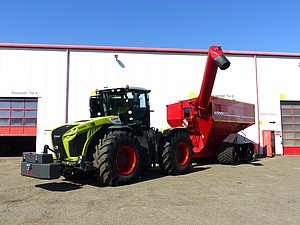
How important is HORSCH for you?
Jonathan Köber: With regard to the turnover HORSCH is right behind Claas. The company is one of our top-sellers. Even though our partnership only started in 2016. Before the sales structure in our sales region was different. The market shares and the turnover developed excellently. We are growing significantly. We are the market leader in the sectors tillage as well as sowing and plant protection technology. And for HORSCH, too, we are of certain importance: in 2018, we ranked third among the sales partners in Germany with regard to turnover. You could say: our co-operation went from nought to what feels like 120…
And everything works smoothly?
Jonathan Köber: It was a great challenge, especially in the service sector, because the machine population was very high right from the start. But we managed together. For us, it was very important that the transitional period would not cause any problems for the customers. And we succeeded.
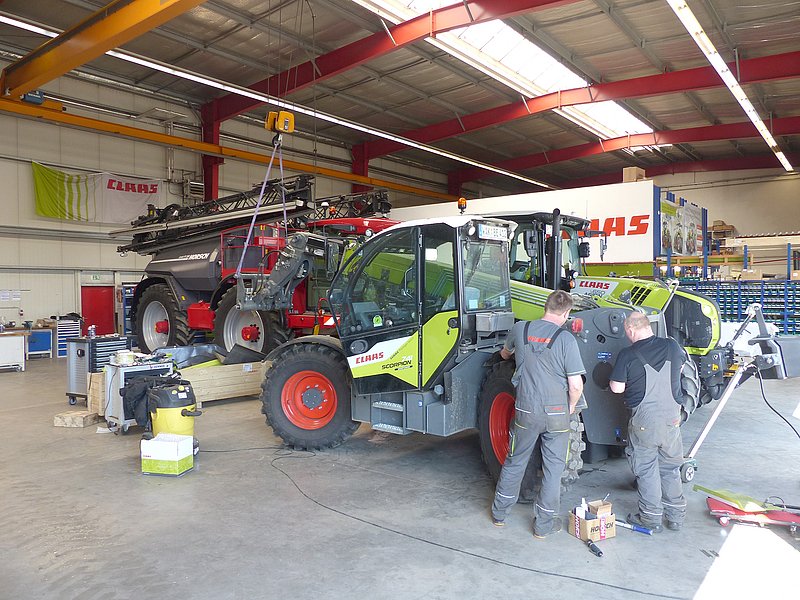
How exactly did you succeed?
Jonathan Köber: Good service definitely is the key to success. We employed additional staff and invested quite some money. At almost all our sites there now are two employees – one for tillage and seed drills and another one for sprayers – who are intensely trained on HORSCH products. Moreover, our HORSCH contacts in the sales and service sector are only a phone call away. HORSCH even assigned one contact for sales promotion to the sales area. For all manufacturers we spend about one million Euro on training. Each one of our employees has about 20 training days per year. Moreover, there is a large number of spare parts which are stored at four sites. Let’s take the electronics of a seed drill as an example. One error can shut down the whole machine. If the worst comes to the worst, we would be able – no matter at which of our sites – to equip the machine with a completely new control system. The seed drill would be ready for use again in no time at all. Our customers normally are arable farms that work in a highly professional way. And their expectations and requirements are accordingly. But I think that in the past years we managed to win their confidence. The service is handled the same way for all brands. We usually employ two foremen in each repair shop. One of them is responsible for receiving the machines, the other one organises the processes and handles bigger technical problems. In the past few years, we ourselves trained three foremen who more and more grew into the organisation of the repair shops. Previously we handled such things centrally, now there are experts at every single site. For us, service is one factor which makes us stand out from our competitors.
![[Translate to englisch:] Geballtes Know-how bei unserem Vor-Ort-Besuch bei der Claas Thüringen Image terraHORSCH issue18-2019: Concentrated know-how during our on-site visit at Claas Thüringen (from the left): managing director Jonathan Köber, Freddy Linzmaier (HORSCH sales promotion central Germany), Emanuel Tasch (HORSCH sales manager central Germany), Ralf Boeck (HORSCH head of sales central Germany), Claas-Thüringen-sales representative Hagen Zeng and Frank Degenhardt (HORSCH service).](/fileadmin/_processed_/a/e/csm_Menschen_2000x_49f2d5ee63.jpg)
Does this have an influence on the new machine business?
Jonathan Köber: Definitely. The development is really positive. This is partly due to the creative concepts we put into practice. It is for example a fact that the customers are no longer ready to buy a machine simply because of some information they get at a show or based on the leaflet of a machine. Even demonstrations often are not enough. We offer the farmers to put a machine including a full service at their disposal for one year for a certain fee. So they can test the machine unhurriedly without any interest burden. I have to admit that our idea behind this system was to create a certain stock of remarketable „young“ second-hand machines. In this respect, however, the campaign was a flop: almost 100 % of the farmers decide to keep the machine (laughs). In addition, we always have about 20 machines to rent, 60 % at short notice, 40 % long-term, limited to four years. An important marketing tool is the annual HORSCH Field Day that this year will take place in Dingelstädt, in the district of Eichsfeld on the 6th of September.
The plant protection sector at HORSCH is growing considerably. What about Claas Thüringen?
Jonathan Köber: It’s quite similar. But that’s no coincidence. For already the second time we organised the „Thuringian competence day for plant protection“ that takes place every two years. At this event we do not only present machines, but there also are interesting speeches about the current and the trend-setting topics in farming. Claas Thüringen does not only want to be a dealer for agricultural machines. We want to lead the discussion of the topics that move us. There is a relatively high share of self-propelled sprayers in our sales area. In the past years, we sold 12 units. This year, we have already sold three.
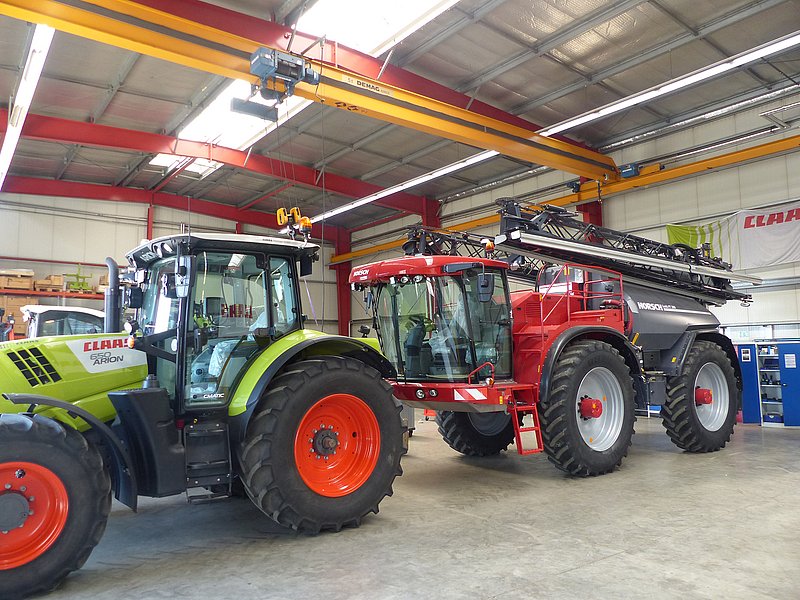
Which HORSCH machines are most important in your sales area?
Jonathan Köber: It always varies a little bit. 2017 was the year of the compact disc harrow. We sold quite a lot of Joker RT. In 2018, the trailed sprayer HORSCH Leeb LT was one of our top-sellers. The Avatar, too, is getting more and more popular. Our customers mainly are impressed by concepts that help them to increase their productivity. Sometimes, however, special campaigns play a certain role, e.g. a funding program for environmentally friendly plant protection technology.
Given the structures of your region there often surely are a lot of subcontracted employees working at the farms of your customers. How do you manage to make them cope with the more and more sophisticated technology?
Jonathan Köber: We do not only train our own employees, but also the employees of our customers. This starts with the initial use that the farm employees carry out supported by us and the HORSCH service technicians. Moreover, in 2016 we started to carry out driver trainings for sprayers and seed drills once a year. The practical part at the machine plays a major role. This is when user, mechanic, service technician and demonstration driver discuss and exchange experiences. For in our opinion it is most important to keep talking to our customers. Together we can solve problems and generate an additional benefit. We will make every effort to make sure that our customer can cultivate, sow and harvest in an optimum way.